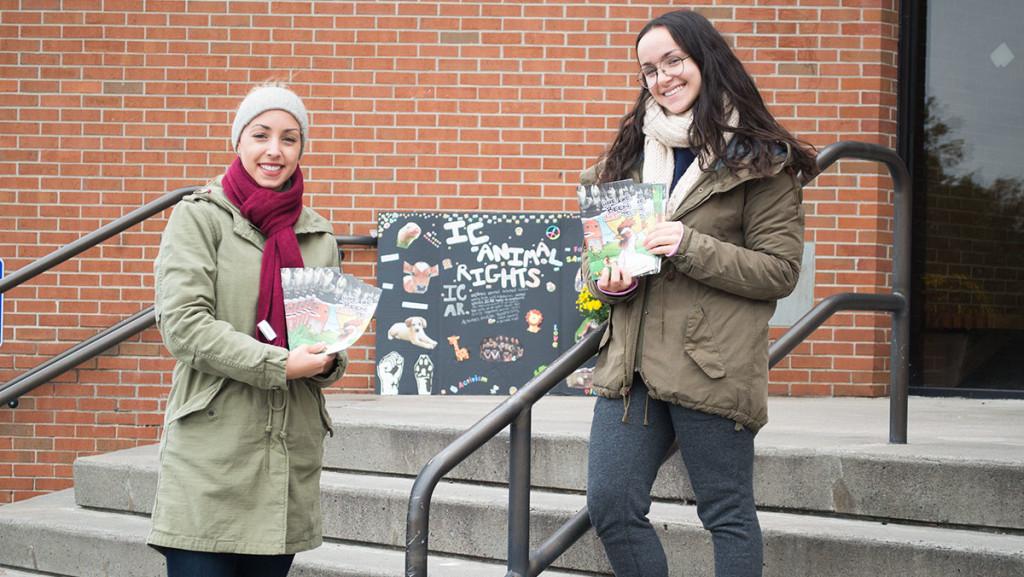Approximately 15 Ithaca College students spent a day passing out pamphlets and fasting to protest factory farming on World Day for Farmed Animals.
“End factory farming #alllivesmatter,” was written on five signs held by members of the IC Animal Rights club as they protested factory farming Oct. 2.
The group protested at multiple locations around the college campus informing students about animal welfare and factory farms. According to the American Society for the Prevention of Cruelty to Animals, factory farms are farms that focus on profit and efficiency at the expense of the animals’ welfare.
Senior Katherine Frappolli, president of IC Animal Rights, and around 15 members set out to inform students about animal cruelty.
There were no chants nor were the protestors disrupting classes, but instead students trying to directly explain animal cruelty to members of the campus community.
“The purpose of the protest was to be informative and peaceful,” she said. “It’s not extremist, it’s not putting it in your face, it’s just raising awareness.”
Frappolli and members of the group also took part in fasting for the day.
“Usually two days before the animals are taken to be slaughtered they are not given any food or water, so it is in remembrance of their pain and suffering,” she said. “Fasting in itself is difficult, but if you have a good enough cause, it is easy.”
Almost 200 of the 300 pamphlets sent to the group by the Farm Animal Rights Movement were handed out. FARM is a nonprofit organization that promotes planetary survival through plant-based eating. The pamphlets had pictures of slaughtered chickens and pigs living in factory farms with statistics displayed to support their cause. The pamphlets — which were created by the national nonprofit against animal cruelty, Mercy For Animals — included statistics such as 51.4 billion turkeys and chickens are killed each year, and to produce one pound of poultry, 13 pounds of grain and 520 gallons of water are required.
Senior Adam Monzella, IC Animal Rights officer, said there are ways of getting protein, calories and nutrients other than eating meat.
“I think that there are a lot of animals that are enduring a great deal of suffering, and it doesn’t have to be that way,” he said. “I think there is a way to raise animals that can be considered ethically permissible, but I think that factory farming just isn’t, and it is really sad how the industry has so much power that they are able to get away with a lot.”
The IC Animal Rights club is in its fourth year and has more activities coming up in the future. On Oct. 10, members will be visiting the Farm Sanctuary, where animals who have been saved from factory farms are rehabilitated and cared for. Frappolli voiced her dedication toward the cause of protecting all lives.
“I always had a natural affinity with animals, and I just have always connected with animals more than people,” Frappolli said.
The protest largely achieved what the club set out to do, Frappolli said.
“I don’t think that everyone we handed pamphlets out to has converted, but this was for exposure and awareness, and I think that we really achieved that today.”
After hearing what the club members had to say, freshman Annie Estes said the information read to her by the group made her think more about her food choices.
“I am definitely going to be more conscious about what I am putting into my body,” she said.








